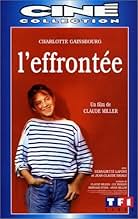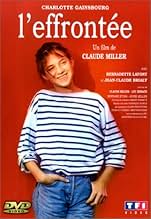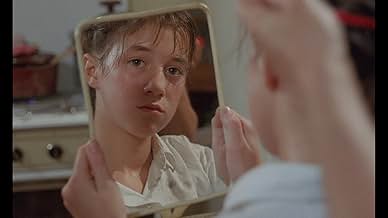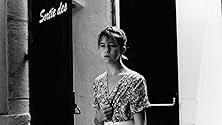L'effrontée
- 1985
- Tous publics
- 1h 36min
NOTE IMDb
6,9/10
2,2 k
MA NOTE
Mal dans sa peau, se trouvant moche et nulle, Charlotte fait tourner son père en bourrique, tourmente la petite Lulu, bref s'ennuie. Quand elle croise au village une célèbre pianiste de son ... Tout lireMal dans sa peau, se trouvant moche et nulle, Charlotte fait tourner son père en bourrique, tourmente la petite Lulu, bref s'ennuie. Quand elle croise au village une célèbre pianiste de son âge, Charlotte fantasme sur une amitié qui l'emporterait au loin. [255]Mal dans sa peau, se trouvant moche et nulle, Charlotte fait tourner son père en bourrique, tourmente la petite Lulu, bref s'ennuie. Quand elle croise au village une célèbre pianiste de son âge, Charlotte fantasme sur une amitié qui l'emporterait au loin. [255]
- Récompenses
- 3 victoires et 6 nominations au total
Simon de La Brosse
- Jacky Castang
- (as Simon de la Brosse)
Armand Barbault
- Patron 'Perroquet'
- (non crédité)
Pascal Bianco-Levrin de Bouzid
- Kid at the Pool
- (non crédité)
Daniel Chevalier
- Professeur Lycée
- (non crédité)
Histoire
Le saviez-vous
- AnecdotesThe film was seen as a return by director Claude Miller to the material of his first feature, La meilleure façon de marcher (1976).
- ConnexionsFeatured in Fan des années 80: 1985 #3 (2012)
- Bandes originalesLe 2ème Concerto de Mendelssohn
Music by Felix Mendelssohn (as Mendelssohn)
Performed by Orchestre des Pays de Savoie
Conducted by Patrice Fontanarosa
Commentaire à la une
François Truffaut and Jacques Doillon who have often worked with children know well one thing: making a movie about childhood or adolescence is a quite difficult thing. Here, it is Claude Miller's turn to broach the delicate topic of adolescence. The less we can say is that he signed here a sensitive and bitter work that brings out enough strength and emotion to compare with the filmmakers' movies previously quoted.
The first indisputable quality that we can put forward is the following one: Claude Miller's film is very far from the clichés generally attributed to teenagers. Charlotte isn't a nymphet, only a teenage girl who is not a happy person and who's searching for love and understanding. The director succeeds very well in making us share his heroine's profound discontentment and Charlotte Gainsbourg won a well-deserved Oscar for her remarkable performance.
Apart from the relevant and convincing description of Charlotte, Miller painted a series of characters who are never on the edge of caricature. Lulu is perhaps a naive little girl and the director somewhat made her look ugly by giving her glasses but he does everything to hide her dumb air. Then, Charlotte's father is presented as a good man and faced with her daughter's insolence, he can contain his anger. One last example, Clara's manager is not obsessed with money. With Charlotte Gainsbourg, it would be unfair to neglect the rest of the cast. Either the actors are young or old, they all have a common point: they are all excellent. This only confirm one gift that Claude Miller had already shown in his first movie, the harrowing "la meilleure façon de marcher" (1976): an excellent direction of actors.
Besides, like in "la meilleure façon de marcher" (1976), "l'effrontée" (1985) is a perfectly stable movie, both funny, touching and where Miller skilfully alternates moments of tension and calm and the rare moments of violence are only suggested like the scene when Charlotte hits Jean with his globe.
Quite obviously, what mainly interested the director in this film is Charlotte's relationship with the most important character of the film: Clara Baumann. Their confrontations constitute the key-moments of the movie. Clara is a talented young pianist and Charlotte blindly idolizes her. She is ready to believe everything she says, even when Clara confides to her that she would like to become her impresario on tour. It is interesting to note down that when she talks about Clara, Claude Miller gently laughs at her naivety. More important, through their relationship, Miller compared their respective worlds. The music used (the song "Sarà, perché ti amo and Mozart) reveal the incompatibility of these worlds and the beginning of the sketched friendship (but is it really friendship?) is eventually bound to fail. To tell this failure, Miller proceeds by little touches: the manager's telephone that doesn't answer, Lulu who creates a scandal during the show. This failure clearly shows Charlotte's disillusion but it doesn't stop the movie to end on a positive tone: when we see the heroine take care of Lulu, she seems to have understood that her place is among her family.
The movie also contains another strong point: the relationship between Jean and Charlotte where Miller favors the progressive rise of tension. For this, he uses the same method as Charlotte's failure with Clara: he proceeds by little touches: the movie they watch at the cinema is "the Exorcist" (1973) and the tension gradually grows and explodes when they are in Jean's hotel room.
I must admit that I don't know enough Claude Miller's work. I only saw "la meilleure façon de marcher" (1976), "la petite voleuse" (1988) and this one "l'effrontée" (1985) but these three films were sufficient to make me a very good impression of this filmmaker and I am long to discover his other opus.
The first indisputable quality that we can put forward is the following one: Claude Miller's film is very far from the clichés generally attributed to teenagers. Charlotte isn't a nymphet, only a teenage girl who is not a happy person and who's searching for love and understanding. The director succeeds very well in making us share his heroine's profound discontentment and Charlotte Gainsbourg won a well-deserved Oscar for her remarkable performance.
Apart from the relevant and convincing description of Charlotte, Miller painted a series of characters who are never on the edge of caricature. Lulu is perhaps a naive little girl and the director somewhat made her look ugly by giving her glasses but he does everything to hide her dumb air. Then, Charlotte's father is presented as a good man and faced with her daughter's insolence, he can contain his anger. One last example, Clara's manager is not obsessed with money. With Charlotte Gainsbourg, it would be unfair to neglect the rest of the cast. Either the actors are young or old, they all have a common point: they are all excellent. This only confirm one gift that Claude Miller had already shown in his first movie, the harrowing "la meilleure façon de marcher" (1976): an excellent direction of actors.
Besides, like in "la meilleure façon de marcher" (1976), "l'effrontée" (1985) is a perfectly stable movie, both funny, touching and where Miller skilfully alternates moments of tension and calm and the rare moments of violence are only suggested like the scene when Charlotte hits Jean with his globe.
Quite obviously, what mainly interested the director in this film is Charlotte's relationship with the most important character of the film: Clara Baumann. Their confrontations constitute the key-moments of the movie. Clara is a talented young pianist and Charlotte blindly idolizes her. She is ready to believe everything she says, even when Clara confides to her that she would like to become her impresario on tour. It is interesting to note down that when she talks about Clara, Claude Miller gently laughs at her naivety. More important, through their relationship, Miller compared their respective worlds. The music used (the song "Sarà, perché ti amo and Mozart) reveal the incompatibility of these worlds and the beginning of the sketched friendship (but is it really friendship?) is eventually bound to fail. To tell this failure, Miller proceeds by little touches: the manager's telephone that doesn't answer, Lulu who creates a scandal during the show. This failure clearly shows Charlotte's disillusion but it doesn't stop the movie to end on a positive tone: when we see the heroine take care of Lulu, she seems to have understood that her place is among her family.
The movie also contains another strong point: the relationship between Jean and Charlotte where Miller favors the progressive rise of tension. For this, he uses the same method as Charlotte's failure with Clara: he proceeds by little touches: the movie they watch at the cinema is "the Exorcist" (1973) and the tension gradually grows and explodes when they are in Jean's hotel room.
I must admit that I don't know enough Claude Miller's work. I only saw "la meilleure façon de marcher" (1976), "la petite voleuse" (1988) and this one "l'effrontée" (1985) but these three films were sufficient to make me a very good impression of this filmmaker and I am long to discover his other opus.
- dbdumonteil
- 26 août 2004
- Permalien
Meilleurs choix
Connectez-vous pour évaluer et suivre la liste de favoris afin de recevoir des recommandations personnalisées
- How long is L'effrontée?Alimenté par Alexa
Détails
Contribuer à cette page
Suggérer une modification ou ajouter du contenu manquant


![Regarder Bande-annonce [OV]](https://m.media-amazon.com/images/M/MV5BNWMwOWFmMzctODMwYS00NDBlLWFiYzYtNDZiMjQwZDk2MzRkXkEyXkFqcGdeQW1haXdlbm4@._V1_QL75_UX500_CR0)

























